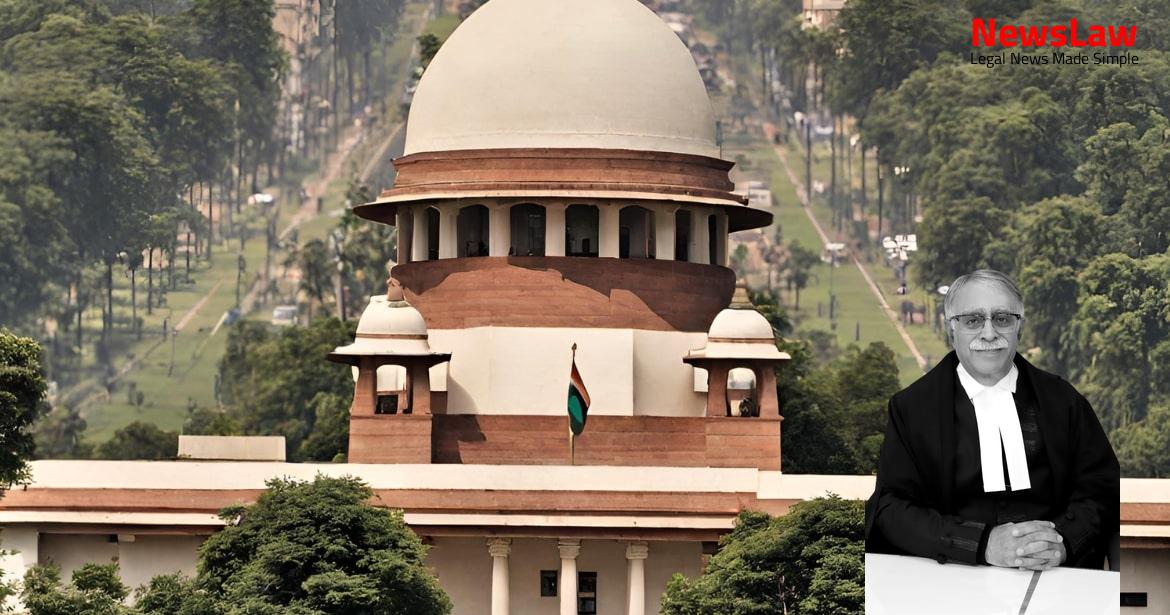In the legal case of Adani Power Rajasthan Ltd. vs. Rajasthan Discoms, a dispute over Late Payment Surcharge has been settled with certain directions by the court. The petitioner, Adani Power Rajasthan Ltd., claimed additional payments citing the Power Purchase Agreement, while Rajasthan Discoms contested the claims. The court’s decision addressed the late payment issue and highlighted the importance of adherence to contractual obligations. Stay updated on the latest developments in this case.
Facts
- Adani Power Rajasthan Limited (APRL) operates a thermal power plant in Rajasthan and is a generating company as per the Electricity Act, 2003.
- The applicant filed a complaint regarding the non-availability of domestic coal, leading to reliance on imported coal from Indonesia at a higher cost.
- The dispute involved additional payments claimed by the applicant as per the PPA-2010.
- The applicant sought a direction for the payment of Rs.1376.35 crore towards Late Payment Surcharge citing the Power Purchase Agreement.
- An additional claim for carrying costs was disallowed by the RERC, leading to appeals by Rajasthan Discoms and the applicant before APTEL.
- Change in law compensation was a condition in the PPA-2010 allowing tariff adjustment payments by the seller.
- The applicant invoked the change in law clause for compensation due to the non-supply of domestic coal.
- The PPA-2010 specified domestic coal as the primary energy source, with imported coal as a backup option.
- RERC held that the applicant would be entitled to relief on account of a change in law
- APTEL found that the applicant’s claim based on ‘change in law’ was valid
- APTEL opined that the applicant was entitled to compensation for the loss caused by the change in law under the SHAKTI scheme
- Three-Judge Bench of the Court dismissed the appeals with specific observations and directions
- APTEL further found that the applicant would be entitled to payment towards applicable carrying cost
- Rajasthan Discoms appealed against the common decision of APTEL before the Court
Also Read: Legal Analysis: Ownership Dispute and Validity of Will Deed
Arguments
- Respondents contend that certain payments made were towards regular domestic linkage coal and nothing else.
- Actual landed cost of alternate coal/imported coal certified by auditors and not disputed by respondents.
- Payment claimed by petitioner based on certified cost not made, making respondents liable for contempt.
- Respondents’ claim of paying energy charges including price of alternate coal/imported coal charges not accepted due to prior non-acceptance of ‘change in law’ claim in 2013.
- Respondents’ assertion of partially accepting ‘change in law’ theory now not valid as it was never raised earlier and was consistently contested by respondents.
- The valuable time of Court is being consumed in deciding various applications, which could otherwise be used to address the litigations of other waiting litigants.
- The litigants waiting for justice for decades are overlooked due to the time spent on such applications.
- The inefficiency in the process is highlighted as it prevents prompt resolution of long-pending cases.
Also Read: Analysis of Curative Jurisdiction in Legal Dispute
Analysis
- The applicant sought relief through a miscellaneous application regarding late payment surcharge as per the judgment of 31.08.2020.
- The Court found that the applicant cannot continue seeking reliefs through miscellaneous applications after the appeal is disposed of.
- The judgment highlighted the growing trend of indirectly seeking review of orders through modifications or clarifications in applications.
- The Court cited instances where post-disposal applications were entertained for specific reasons.
- The Judgment emphasized that post-disposal applications for modification or clarification should be rare and only in cases where the executory nature of the order becomes impractical due to subsequent events.
- The Court clarified certain aspects like transportation mode and issues about over-invoicing put forth by the applicant.
- The judgment reiterated that certain issues raised by the applicant were not relevant to the contempt proceedings.
- The Court also discussed the extension of time related to a demolition order, emphasizing the jurisdiction to extend time on valid grounds.
- The judgment specifically addressed the applicant’s attempt to seek reliefs beyond what was granted in the main judgment using a miscellaneous application.
- In the event of delay in payment of a Supplementary Bill by either Party beyond its Due Date, a Late Payment Surcharge shall be payable.
- The Seller shall pay all amounts due under a Supplementary Bill raised by Procurer(s) by the Due Date to concerned Procurer’s designated bank account.
- Rebate applicable to Monthly Bills pursuant to Article 8.3.6 shall equally apply for payments by the Procurer(s).
- Either Party may raise a bill on the other Party (supplementary bill) for payment on account of adjustments required by the Regional Energy Account, Tariff Payment for change in parameters, or Change in Law.
- The Procurers shall remit all amounts due under a Supplementary Bill raised by the Seller to the Seller’s Designated Account by the Due Date.
- Dr. Singhvi relied on three specific orders in the case of Uttar Haryana Bijli Vitran Nigam Ltd. & Anr. vs. Adani Power (Mundra) Limited.
- The third order, dated 09.12.2022, in the case of Kalpataru Properties Pvt. Ltd. vs. Indiabulls Housing Finance Ltd. was also cited.
- The case of Ghanashyam Mishra & Sons Private Limited vs. Edelweiss Asset Reconstruction Company Limited was mentioned, where a two-Judge Bench made specific observations on the matter.
- The attempt in the miscellaneous application was deemed as seeking substantive modification of the court’s judgment.
- The relevance and context of the cited cases were discussed in relation to the present matter.
- Order of the Court does not discuss the maintainability of the application
- The issue of maintainability was not raised at that stage
- The observations made should not be construed to mean the application was found maintainable
Also Read: Contractual Interpretation in Real Estate Dispute
Decision
- The petitioner is entitled to payment based on the calculations up to November 2021, totaling Rs.130.69 crores.
- The due amount up to November 2021 is Rs.5344.75 + Rs.130.69 = Rs.5475.44 crores.
- It is deemed appropriate for the appellants, Rajasthan Discoms, to pay interest/late payment surcharge as per the applicable SBAR, not exceeding 9% per annum.
- The respondents are directed to pay the principal amount minus the amount deposited in terms of the interim order, along with interest not exceeding 9% per annum, within four weeks.
- If the payment is not made, respondents must appear before the Court.
- The contempt petitions were directed, and costs of Rs. 50,000/- to be paid to the Supreme Court Legal Aid Committee by the applicant.
- The present application is dismissed, and interest at a maximum rate of 9% per annum is to be applied from the due date until actual payment.
- The balance amount of Rs.3048.63 crores is stated to be due up to November 2021.
Case Title: JAIPUR VIDYUT VITRAN NIGAM LTD. Vs. ADANI POWER RAJASTHAN LTD. (2024 INSC 213)
Case Number: MA-000658-000659 / 2024



